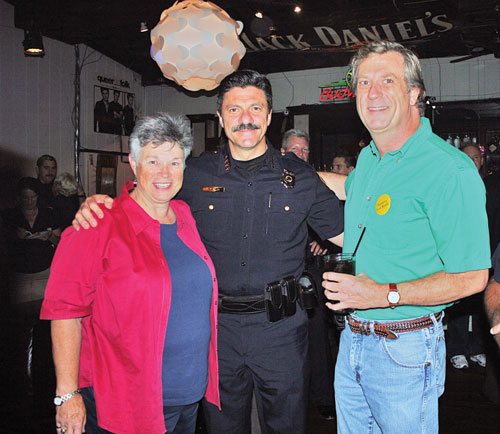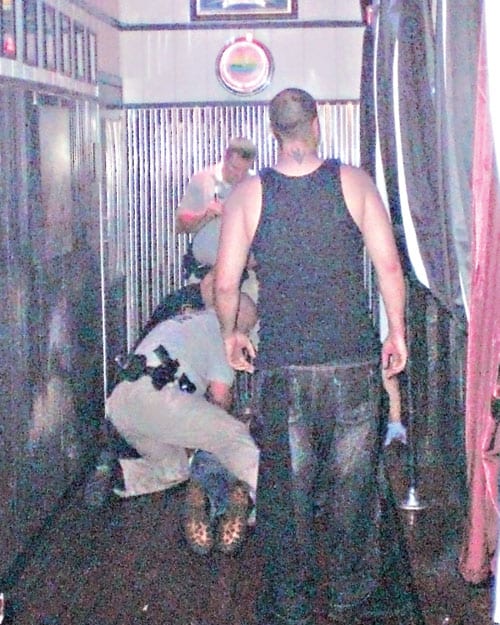Impact of the raid on a Cowtown gay bar in 2009 continues to be felt in Fort Worth and beyond

ROUGH HANDLING | Witnesses said TABC agents and Fort Worth PD officers injured Chad Gibson when they threw him to the floor inside the bar and handcuffed him. (Courtesy photo)
It was just after midnight on June 28, 2009 — officially, the 40th anniversary of the Stonewall Riots in New York, the 40th birthday of the modern gay rights movement — when a team of agents with the Texas Alcoholic Beverage Commission and officers with the Fort Worth Police Department went into the newly opened Rainbow Lounge.
What ostensibly started as a bar check quickly became a bar raid. More than a dozen patrons were detained and taken outside the club for questioning. Seven were handcuffed and arrested for public intoxication and other charges. And as horrified patrons looked on, a young man named Chad Gibson was thrown to the floor and handcuffed.
Witnesses inside the bar — including activist and Q Cinema founder Todd Camp and an accountant named Tom Anable who was there checking receipts for the bar’s owners — said that TABC agents’ assault on Gibson was unprovoked. They said the agents grabbed the intoxicated man and slammed him facedown on the floor, banging his head on the edge of a raised platform near the back of the bar, before handcuffing him and taking him outside. Agents said that Gibson stumbled and fell of his own accord outside the bar, hitting his head on the concrete sidewalk.
Either way, Gibson ended up hospitalized with a head injury, including bleeding in his brain. And the city of Fort Worth and the TABC ended up at the middle of an international uproar within hours, thanks to the power of the Internet and social media.
The initial responses by city and state officials sparked even more outrage: In his first statement to the press regarding the incident, Fort Worth Police Chief Jeff Halstead suggested Rainbow Lounge’s gay patrons had provoked the response by groping officers and making sexual advances. Those same leaders soon began working to mend fences.
Within days, a group of LGBT community leaders — including Camp, Anable, attorney Jon Nelson and church leader the Rev. Carol West — had formed Fairness Fort Worth. Initially intended to coordinate community response to the raid and resources for those who were arrested, FFW soon morphed into the city’s first LGBT activist/educational organization, using connections with city leaders such as gay Councilman Joel Burns and lesbian Human Relations Commission member Lisa Thomas to reach out to Halstead and other city officials.
With an astounding speed to those used to working for years for progress, Halstead had appointed his department’s first-ever LGBT liaison officer, Sara Straten. The City Council approved a wide-ranging nondiscrimination ordinance that surpassed Dallas’ similar ordinance by including protections for transgenders. Policies and procedures were changed. The FWPD officers involved in the raid were reprimanded for failing to follow procedures; the TABC fired three agents and reprimanded two others for their parts in the affair.
Carolyn Beck, spokeswoman for TABC, said this week that the impact of that night in Fort Worth continues to be felt at the agency — and that’s a good thing.

ONE YEAR LATER | One year after the Rainbow Lounge raid, Fort Worth Police Chief Jeff Halstead, center, visited with FFA members the Rev. Carol West and David Mack Henderson during an event at
the bar. (Tammye Nash/Dallas Voice)
“I think we have more direct and open lines of communication with the LGBT community, especially in the Dallas/Fort Worth/Arlington area,” she said. “I am still in touch with some folks I met as a result of the Rainbow Lounge incident and value those relationships for personal and professional reasons. We are a better organization than we were five years ago, and I expect that we will continue to evolve and improve as we find better ways to work with the people we regulate and keep all communities safe.”
The Fort Worth City Council also initiated sensitivity training not just for its police officers, but for all its employees, as did TABC.
It all happened very fast. But five years later, the question is, has it lasted? Has even more progress been made? Current Fairness Fort Worth President David Mack Henderson said this week, the answer is yes.
“Not everything we have asked for has come to fruition,” Henderson said. But yes, it is better now, because there is an organization in place here that builds bridges. As long as there is an open dialog continuing, we will make progress.
“When Fairness Fort Worth started out, we were doing what I call brush fire work. But we were also laying the groundwork for something more lasting. That was our biggest success — our ability to create dialog and keep it going.”
In those initial hectic months, LGBT activists led by FFW presented city officials with a list of 20 items they wanted to see accomplished.
These days, Henderson said, “some of those items have cobwebs on them.”
He pointed specifically to the demand that city officials include support for LGBT rights in its legislative agendas at the state and federal levels. For the first couple of years after the raid, Henderson said, the city followed through. “But recently, that language has disappeared.
We want to get it back in there. Some of these things, like the legislative agendas, require maintenance. We as a community have to be vigilant to make sure the city keeps its commitments.”
Another area in which there has been progress made, but there is still progress needed involves health insurance benefits for the city’s transgender employees. Henderson said city officials have just recently clarified where those benefits stand.
“We have yet to get full health insurance coverage for the city’s trans employees. The actual gender reassignment surgery is not covered,” he said. “But we have been able to clarify what coverage is offered. This was a matter of equity and current medical need. The city did its homework and they have confirmed that the health plan covers services for transgender employees that would be available to employees of either gender and that are medically necessary.”
That means that trans employees who need hormone treatments can get those treatments. It also includes preventative screenings, such as prostate cancer screenings for male-to-female trans employees.
Sensitivity training for city officials has continued and even expanded to Arlington, Henderson confirmed this week. He said FFW recently began LGBT awareness training for all of the Arlington Police Department’s employees — sworn officers and civilians. The response so far, he said, has been “very, very good.”
“Fairness Fort Worth has been contracted to provide the training and we are actually being compensated for that work,” Henderson said.
“The corporate world has long known that there is real value in this kind of work and has been willing to compensate those that provide it. It is nice to know that government agencies and others are beginning to recognize that value, too.”
There’s more. Henderson said that FFW is now able to work directly with Fort Worth Independent School District schools to deal with situations involving bullying. “People know to call us now. Because of our reputation, we can get in the door and we can help these students in crisis situations,” he said.
FFW also has access to make sure that FWISD students trying to form gay-straight alliances in their school are allowed to do so, and that they have access to all the same resources as other school groups. The number of GSAs, he said, “is growing exponentially” in Tarrant County, even in the junior high and middle schools.
And FFA has recently undertaken a new project to “provide comprehensive information to all areas high school principals. Not everyone has gotten the memo that the times and the laws have changed. We are here to make sure they know, that they read the laws and that they follow them.”
Fairness Fort Worth is moving in new directions, too. The organization has invited experts from Washington, D.C., to come to Fort Worth to “educate our community on the provisions of the Affordable Care Act for LGBT families.”
And in the fall, around the time of the Dallas and Fort Worth Pride celebrations, the organization will stage a fundraiser to honor community members “who have made a difference and who continue to pay it forward,” while at the same time launching FFW’s Legacy Project, which will begin building the resources necessary to provide LGBT community programs in Tarrant County, Henderson said.
There have been setbacks, for the community and at the personal level for many of those involved.
Anable — who had for most of his life stayed out of the realm of activism — was energized by what happened that night at Rainbow Lounge and almost overnight became one of the city’s most out and most outspoken LGBT activists. In January 2010, when FFW incorporated, Anable became the organization’s second president, eventually selling his CPA firm to focus on activism full time.
But a little more than two years later, in August 2012, Anable was dead by his own hand.
“Tom was so closely affiliated with Fairness Fort Worth, that ever since he died there have been rumors it was because of his role with the organization or his activism. But that isn’t true,” Henderson said.
“His death had nothing to do with his work with Fairness Fort Worth. It’s easy to conflate the two, but Tom had his own demons long before Fairness Fort Worth ever came along. Unfortunately, he couldn’t find a better solution for fighting them.”
But there have been many personal victories, too. Tori Van Fleet Kujala, a forensics expert with the Fort Worth PD, became one of the faces of LGBT rights in Tarrant County when she came out at a Fort Worth City Council meeting as a trans woman during the effort to pass a trans-inclusive human rights ordinance. It was a hard decision to make, she said, but it’s one she doesn’t regret.
“It got me into advocacy and helped me accept me and speak to people about my being transsexual,” Kujala said. “You can say that I’m the happiest girl in the world. I’ve got a life and a job that I love, and a husband that loves me dearly. Life is wonderful for me in Fort Worth.”
This article appeared in the Dallas Voice print edition June 27, 2014.











